Shocking Your Pool: Should You Go With Granular Or Liquid Chlorine?
A Factory Pools Perth Article
If you are confused about using granular shock or liquid chlorine in your pool, you're not alone. It's one of the most common questions among pool owners and those in charge of maintaining a swimming pool. Here's the simple answer: both granular shock and liquid chlorine help get rid of bacteria, pollutants, and algae from your pool. When used correctly, both are equally effective. However, there are pros and cons to liquid chlorine and granular shock. The final answer depends on your requirements and what you feel more comfortable using.
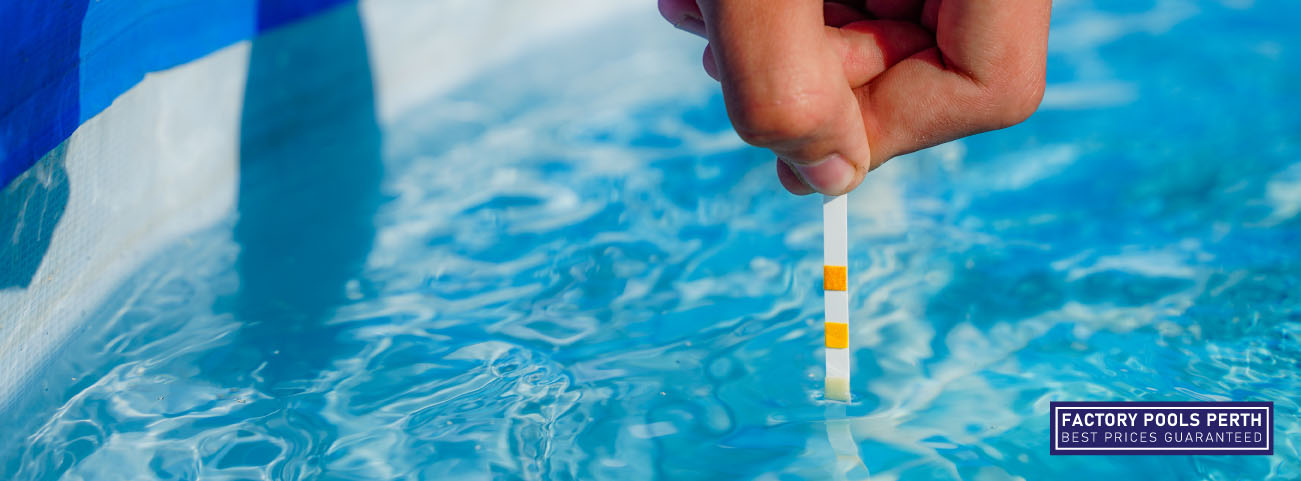
Let's find out more about granular shock and liquid chlorine. But first, let's understand the basics of pool shocking.
Things to know about pool shocking
We shock our pools for two reasons:
- to get rid of all combined chlorine present in the pool
- to kill organic contaminants present in the pool
Typically, you have to add 10 times the amount of chlorine in your pool (in ppm) to give it a shock. Chlorine-free shock is a special type of pool shock that doesn’t affect bacteria and algae but kills non-living organic contaminants and chloramine. As a result, it increases the efficiency of chlorine present in the water. Apart from chlorine-free shock, other types of pool shock kill algae and bacteria as well.
Liquid shock
As the term suggests, liquid shock involves using liquid chlorine to shock your pool. There are several advantages of chlorine in liquid form compared to granular/powder form. First, liquid chlorine disperses in your pool easily and effortlessly. On top of that, it doesn’t leave behind any residue. Liquid chlorine has no effect on Cyanuric Acid or Calcium Hardness, which is a good thing.
But there are disadvantages of liquid chlorine as well. Its high strength is both an advantage and disadvantage. Commercial liquid bleach has up to 12.5% available chlorine, which is more than twice the amount present in household bleach. The high strength of liquid chlorine poses a health risk, especially if there are children around.

Should you use liquid chlorine?
There’s no straightforward answer to this question. Liquid chlorine is undoubtedly effective in maintaining your pool. It also has many advantages of granular chlorine, like easy dispersal and strong action. However, finding liquid chlorine can be a challenge in itself. Commercial-grade liquid chlorine isn’t easily available. As we already discussed, it’s a high-strength chemical with potential health hazards. Only pool suppliers sell commercial-grade liquid shock. Moreover, you can’t buy it online since it’s considered a dangerous chemical for shipping.
If you have a pool distributor nearby or can arrange liquid chlorine (high strength), then go for liquid shock by all means. It’s a simple and easy way of performing pool shock and is often more effective than granular chlorine. That said, liquid chlorine is less expensive than granular chlorine. It also has a shorter shelf-life, so you can’t buy it in bulk and store it for the year. When exposed to light or heat, its shelf life goes further down.
Another technical downside of liquid chlorine is the fact that it increases Total Dissolved Solids (TDS). TDS in normal swimming pools shouldn’t exceed 1,500 to 2,000 ppm, and liquid chlorine can cross that mark if used in excess.
Liquid chlorine isn’t the safest pool shock option. It can splash, leading to minor to severe injuries. It can also stain your clothes or other surfaces. Anyone using liquid chlorine has to be very cautious. The final choice boils down to what you find easier. If you are a cautious person and you have access to liquid chlorine, it can be a better option than granular chlorine. But in many cases, you would be better off with granular chlorine instead.
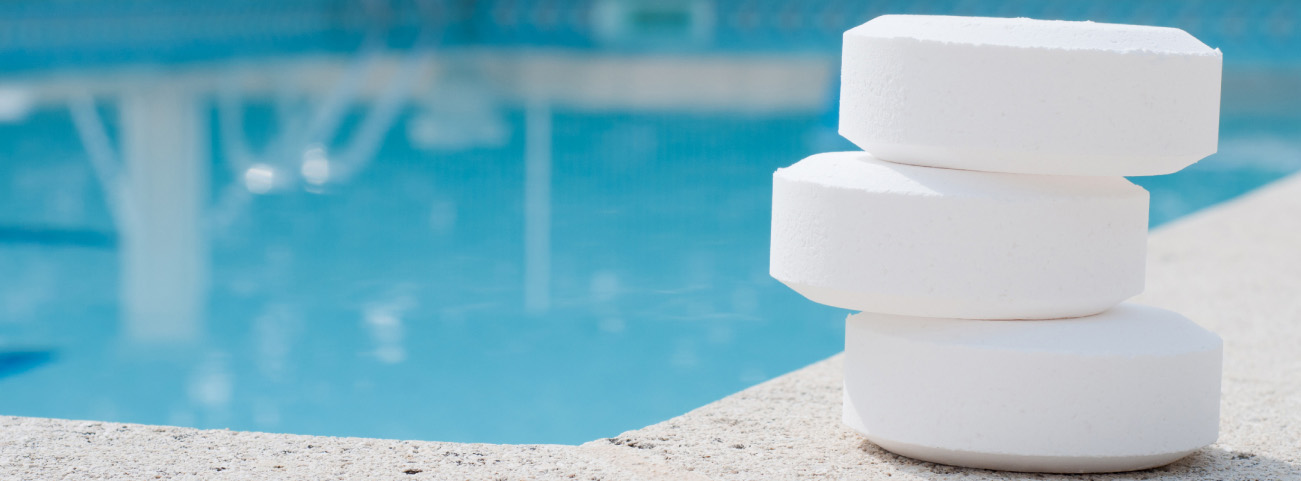
Granular shocks
Granular chlorine is widely available, and it’s been the most common pool shock agent for at least 50 years now. The ease of using granular protein and its widespread availability trump many of its disadvantages. Let’s address the disadvantages first, and then we’ll move to the advantages.
Disadvantages of granular protein for pool shock
Granular chlorine is more expensive than liquid chlorine, though the difference may not be stark when you buy it at discounted rates. Both granular and liquid chlorine share one disadvantage: they can increase calcium hardness or cyanuric acid levels.
Using certain forms of granular chlorine is cumbersome and time-consuming. For example, you’ll first have to dissolve it in water and then use it in your pool. This takes considerably more time than using liquid chlorine. The pool water can also turn cloudy after using granular shock, and it takes quite some time to settle down.
These are the main disadvantages of using granular protein for pool shocks. Now, let’s talk about its advantages.
Advantages of granular protein for pool shock
One area where granular shock clearly beats liquid shock is availability. You can easily buy granular chlorine from any home development store or even online. It’s available in different types, and each has its own use case.
For example, dichlor, or sodium dichloro-s-triazinetrione, is a type of premium shocking agent that eliminates contaminants without leaving any residue. On the other hand, calcium hypochlorite, or cal-hypo, is a potent chlorine that kills all bacteria, algae, and pollutants in the pool. It is also extremely easy to use when you’re cleaning your pool.
With a non-chlorine shock, your pool will be ready for use in just around 15 minutes after application. It’s easy to store granular chlorine, and it’s available in different strengths.
Conclusion: Should you go with granular or liquid chlorine?
While both granular and liquid chlorine has their pros and cons, granular chlorine is more common in home pools. It’s cheaper, easy to use, easy to store, and lasts a long time.
More premium pools often go for liquid chlorine because of its long-lasting effect on the pool. However, there’s no watertight categorisation. If you haven’t used granular chlorine or liquid chlorine, you can give it a try and see which works best for you.
You must handle liquid chlorine with caution since it’s a dangerous chemical. Apart from that, there are pros and cons to both.
Shocking Your Pool: Should You Go With Granular Or Liquid Chlorine?
A Factory Pools Perth Article
If you are confused about using granular shock or liquid chlorine in your pool, you're not alone. It's one of the most common questions among pool owners and those in charge of maintaining a swimming pool. Here's the simple answer: both granular shock and liquid chlorine help get rid of bacteria, pollutants, and algae from your pool. When used correctly, both are equally effective. However, there are pros and cons to liquid chlorine and granular shock. The final answer depends on your requirements and what you feel more comfortable using.
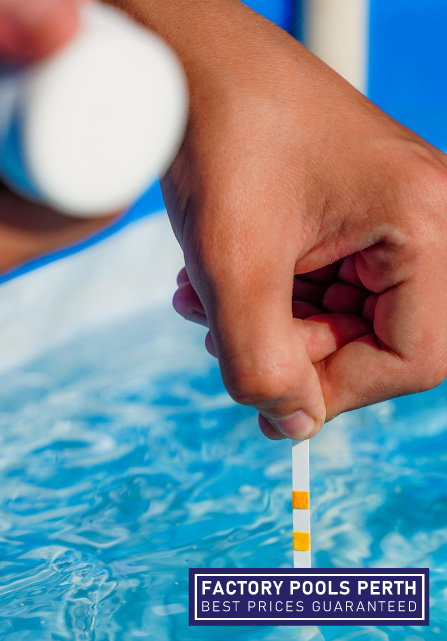
Let's find out more about granular shock and liquid chlorine. But first, let's understand the basics of pool shocking.
Things to know about pool shocking
We shock our pools for two reasons:
- to get rid of all combined chlorine present in the pool
- to kill organic contaminants present in the pool
Typically, you have to add 10 times the amount of chlorine in your pool (in ppm) to give it a shock. Chlorine-free shock is a special type of pool shock that doesn’t affect bacteria and algae but kills non-living organic contaminants and chloramine. As a result, it increases the efficiency of chlorine present in the water. Apart from chlorine-free shock, other types of pool shock kill algae and bacteria as well.
Liquid shock
As the term suggests, liquid shock involves using liquid chlorine to shock your pool. There are several advantages of chlorine in liquid form compared to granular/powder form. First, liquid chlorine disperses in your pool easily and effortlessly. On top of that, it doesn’t leave behind any residue. Liquid chlorine has no effect on Cyanuric Acid or Calcium Hardness, which is a good thing.
But there are disadvantages of liquid chlorine as well. Its high strength is both an advantage and disadvantage. Commercial liquid bleach has up to 12.5% available chlorine, which is more than twice the amount present in household bleach. The high strength of liquid chlorine poses a health risk, especially if there are children around.
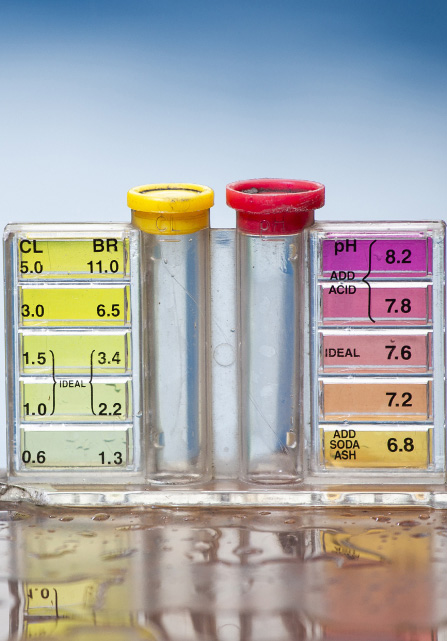
Should you use liquid chlorine?
There’s no straightforward answer to this question. Liquid chlorine is undoubtedly effective in maintaining your pool. It also has many advantages of granular chlorine, like easy dispersal and strong action. However, finding liquid chlorine can be a challenge in itself. Commercial-grade liquid chlorine isn’t easily available. As we already discussed, it’s a high-strength chemical with potential health hazards. Only pool suppliers sell commercial-grade liquid shock. Moreover, you can’t buy it online since it’s considered a dangerous chemical for shipping.
If you have a pool distributor nearby or can arrange liquid chlorine (high strength), then go for liquid shock by all means. It’s a simple and easy way of performing pool shock and is often more effective than granular chlorine. That said, liquid chlorine is less expensive than granular chlorine. It also has a shorter shelf-life, so you can’t buy it in bulk and store it for the year. When exposed to light or heat, its shelf life goes further down.
Another technical downside of liquid chlorine is the fact that it increases Total Dissolved Solids (TDS). TDS in normal swimming pools shouldn’t exceed 1,500 to 2,000 ppm, and liquid chlorine can cross that mark if used in excess.
Liquid chlorine isn’t the safest pool shock option. It can splash, leading to minor to severe injuries. It can also stain your clothes or other surfaces. Anyone using liquid chlorine has to be very cautious. The final choice boils down to what you find easier. If you are a cautious person and you have access to liquid chlorine, it can be a better option than granular chlorine. But in many cases, you would be better off with granular chlorine instead.
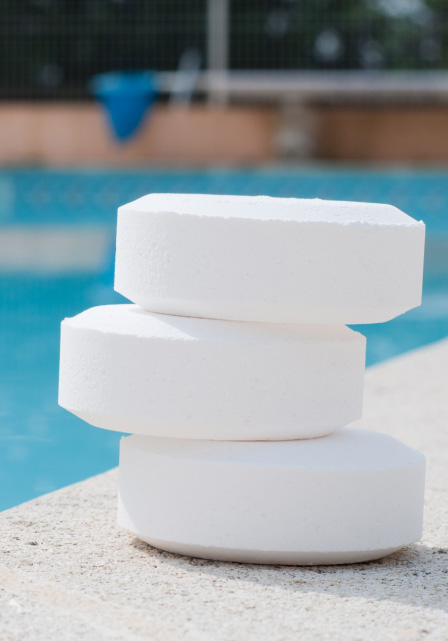
Granular shocks
Granular chlorine is widely available, and it’s been the most common pool shock agent for at least 50 years now. The ease of using granular protein and its widespread availability trump many of its disadvantages. Let’s address the disadvantages first, and then we’ll move to the advantages.
Disadvantages of granular protein for pool shock
Granular chlorine is more expensive than liquid chlorine, though the difference may not be stark when you buy it at discounted rates. Both granular and liquid chlorine share one disadvantage: they can increase calcium hardness or cyanuric acid levels.
Using certain forms of granular chlorine is cumbersome and time-consuming. For example, you’ll first have to dissolve it in water and then use it in your pool. This takes considerably more time than using liquid chlorine. The pool water can also turn cloudy after using granular shock, and it takes quite some time to settle down.
These are the main disadvantages of using granular protein for pool shocks. Now, let’s talk about its advantages.
Advantages of granular protein for pool shock
One area where granular shock clearly beats liquid shock is availability. You can easily buy granular chlorine from any home development store or even online. It’s available in different types, and each has its own use case.
For example, dichlor, or sodium dichloro-s-triazinetrione, is a type of premium shocking agent that eliminates contaminants without leaving any residue. On the other hand, calcium hypochlorite, or cal-hypo, is a potent chlorine that kills all bacteria, algae, and pollutants in the pool. It is also extremely easy to use when you’re cleaning your pool.
With a non-chlorine shock, your pool will be ready for use in just around 15 minutes after application. It’s easy to store granular chlorine, and it’s available in different strengths.
Conclusion: Should you go with granular or liquid chlorine?
While both granular and liquid chlorine has their pros and cons, granular chlorine is more common in home pools. It’s cheaper, easy to use, easy to store, and lasts a long time.
More premium pools often go for liquid chlorine because of its long-lasting effect on the pool. However, there’s no watertight categorisation. If you haven’t used granular chlorine or liquid chlorine, you can give it a try and see which works best for you.
You must handle liquid chlorine with caution since it’s a dangerous chemical. Apart from that, there are pros and cons to both.



